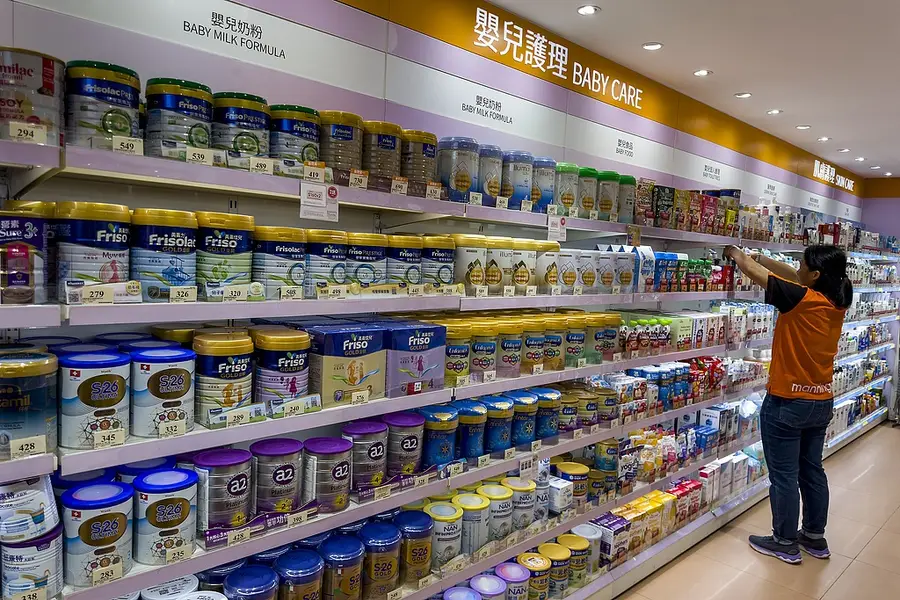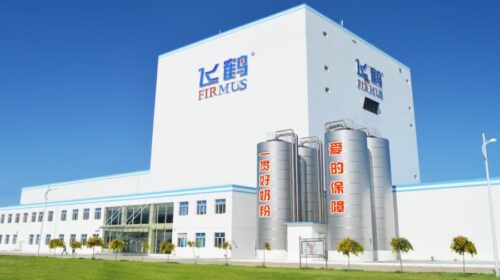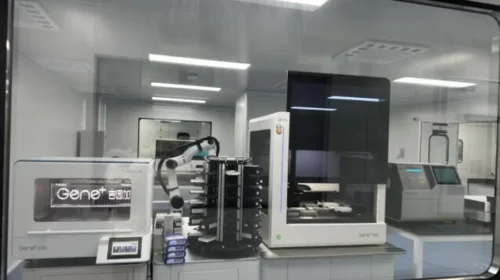Yangtuo bets on small-town moms despite declining birth rates

The infant products e-commerce platform has filed for a Hong Kong IPO, hoping investors will buy into its transformation story after its revenue flatlined last year
Key Takeaways:
- Yangtuo’s infant products e-commerce platform targets lower-tier Chinese cities, towns and villages that account for 85% of its newborns
- The company’s revenue flattened in 2024 and it lost money, as it shifts from its original B2B e-commerce focus to a direct sales model with its own brands
By Edith Terry
China’s dairy industry may be past its prime, as plunging fertility rates cause demand for infant formula and other dairy products to slowly dry up. But Yangtuo Technology Inc. hopes to convince investors that there’s still potential in the field, saying it understands moms in the nation’s smaller markets better than any of its competitors.
The operator of an e-commerce platform selling infant formula and other baby products filed for a Hong Kong IPO at the end of June, boasting an all-star cast of Citic Securities as its underwriter and Fosun, Hillhouse and Lei Jun, co-founder of smartphone giant Xiaomi, among its backers. The company has already raised nearly $200 million over six previous funding rounds, suggesting the Hong Kong IPO could raise another $100 million or more.
Yangtuo’s core management team also boasts strong e-commerce credentials, with many of its members harkening from industry leader Alibaba (BABA; 9988.HK). Zhao Chen, the company’s 43-year-old founder and CEO, worked for nine years at Alibaba, where he played a key role in the launch of its Tmall Global. COO Xu Hong managed Taobao Coins, Alibaba’s consumer loyalty program, and CTO Xiao Jiantao was part of the launch team for Juhuasuan, a group buying site on Tmall.
Yangtuo’s target market is growing, though not very fast, reflecting plateauing demand for infant nutritional products. According to third-party market data in the listing document, China’s family care and nutrition product market grew from 2.2 trillion yuan ($307 billion) in sales in 2019 to 2.6 trillion yuan in 2024, averaging just 2.9% annual growth during that time.
The market is dominated by lower tier cities that are Yangtuo’s focus and account for nearly three-quarters of national sales. That segment grew from 1.6 trillion yuan in 2019 to 1.9 trillion yuan in 2024, translating to a faster growth rate of 3.4%. The lower-tier market is expected to increase to 2.4 trillion yuan by 2029, driven by its massive consumer base and growing health awareness and spending power among local residents.
Regions beyond China’s largest first- and second-tier cities have a population of 1.2 billion, accounting for 83.5% of the country’s population and 85% of its newborns in 2024, according to the listing document.
Yangtuo’s biggest sales areas are in Central China’s Henan province, as well as the relatively affluent coastal provinces of Zhejiang and Guangdong, which has China’s highest birth rate. Yangtuo cites research showing that per capita consumption of family care and nutrition products is rising faster in lower-tier markets than in China’s big cities, growing at an average 5.5% annually in the former versus 3.1% in the latter in recent years.
Yangtuo is best known in China for Hipac, its B2B e-commerce app that connects manufacturers with retail shops. But the company is shifting to an online-to-offline (O2O) business model where it sells directly to those shops, rather than simply acting as a middleman between buyers and sellers. It’s the top player in its niche in terms of retail sales, with gross merchandise value (GMV) of 8.6 billion yuan ($1.19 billion) in 2024, and 10.1% of the family care and nutrition products market in lower-tier cities.
Weak financials
Despite the market’s huge size, Yangtuo’s recent financials look relatively weak, as consumers throughout China grow increasingly cautious. The company’s revenue flatlined between 2023 and 2024, dropping slightly from 1.07 billion yuan to 1.03 billion yuan over that period. Its gross margin has also dropped steadily over the last three years, falling from 43.9% in 2022 to 32.5% last year.
The company’s bottom line looks similarly unimpressive, including losses of 52.1 million yuan in 2023 and 78.4 million yuan in 2024, reversing a profit of 1.8 million yuan in 2022. On an adjusted basis, which excludes the impact of convertible redeemable preferred shares and equity-settled share-based payments to its investors, the company was profitable in the last two years.
Yangtuo blames the weak numbers on its strategic shift to a business model that gives it more control of its supply chain but typically carries lower margins. Its original B2B e-commerce business, started in 2015, specialized in selling infant formula from major China-based brands to stores in lower-tier cities. The newer O2O model sees Yangtuo sell directly to a huge network of buyers, many of them small mom-and-pop stores.
Yangtuo has spent the last six years building a self-operated business that gives it more control over its supplier network, as it sells directly to its buyers. That business includes a growing number of the company’s own products and brands, such as its rice crackers for babies called “Wonder Miao” and its Doctor Jepson line of nutrition drinks.
Revenue from Yangtuo’s self-operated business reached 802 million yuan in 2024, or about 80% of its total that year, though its self-operated brands were just a small portion of that, with revenue of 222.2 million yuan last year. Revenue from the company’s digital marketplace business, where it acts as a middleman between buyers and sellers, has been declining over the last two years, falling to just 229 million yuan – or 22% of total revenue – in 2024.
The shift to a more asset-heavy model could raise risks associated with inventory management and the potential for non-payments by retail customers. The company’s inventory rose by more than 30% from 59.5 million yuan to 74.7 million yuan between 2022 and 2024, while its trade receivables also rose from 3.2 million yuan to 13.5 million yuan over that time.
While much larger e-commerce companies like Pinduoduo (PDD.US) also target buyers in lower-tier cities, Yangtuo is tightly focused on its niche of child-care and family nutritional products. It plans to use proceeds from the IPO to build up its self-operated business in that niche, including through deeper collaboration with leading infant formula brands and better control over pricing terms.
Many of Yangtuo’s competitors in the infant products area have imploded in recent years, including BabyTree Group, which delisted from Hong Kong last December, and cross-border e-commerce company Mia.com, which shut down its app in 2022.
Many of these companies, including Yangtuo, are exposed to China’s declining birthrate, which dropped for seven consecutive years until rising slightly in 2024 to 6.77 births per thousand, according to the National Bureau of Statistics. 2024 was the Year of the Dragon, an auspicious year on the Chinese zodiac favored by expectant parents, which could explain the slight uptick. But many expect the declines to resume over the longer term, posing challenges for Yangtuo and other companies chasing China’s dwindling infant market.
To subscribe to Bamboo Works weekly free newsletter, click here






